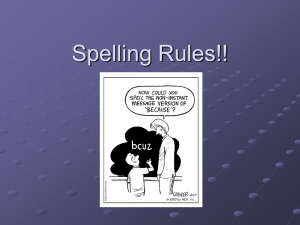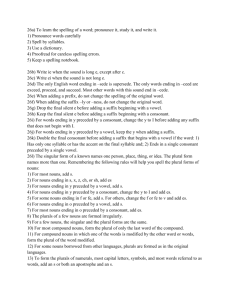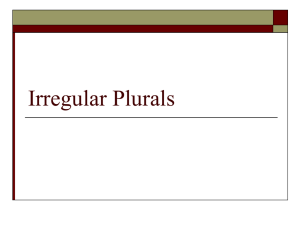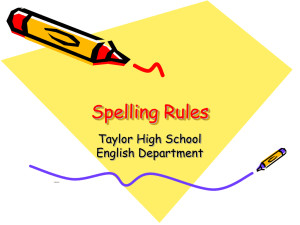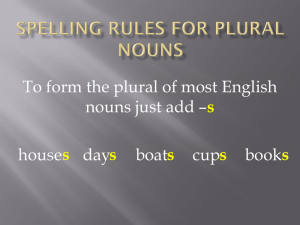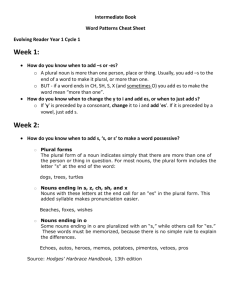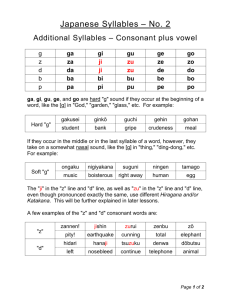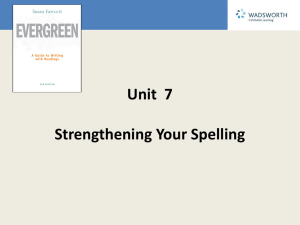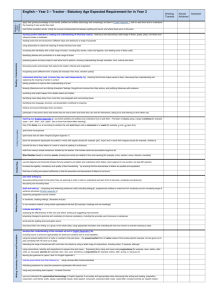Spelling Rules and Generalizations
advertisement
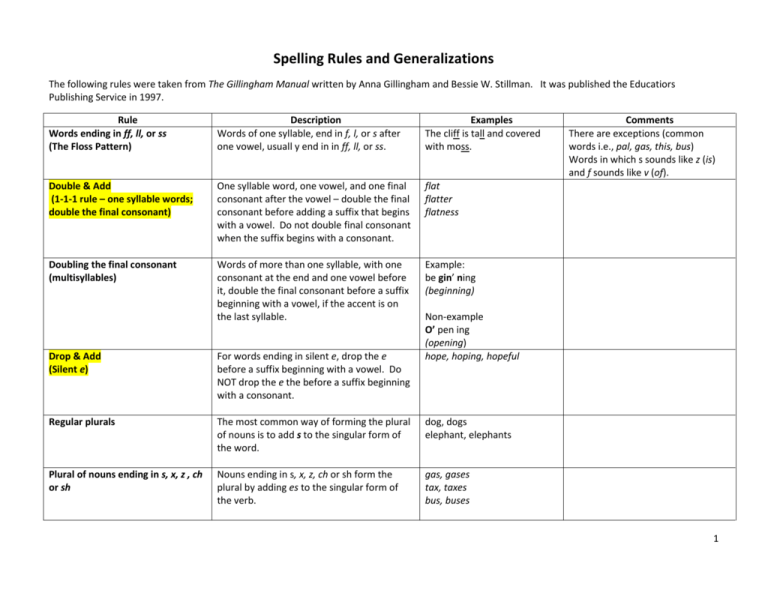
Spelling Rules and Generalizations The following rules were taken from The Gillingham Manual written by Anna Gillingham and Bessie W. Stillman. It was published the Educatiors Publishing Service in 1997. Rule Words ending in ff, ll, or ss (The Floss Pattern) Description Words of one syllable, end in f, l, or s after one vowel, usuall y end in in ff, ll, or ss. Examples The cliff is tall and covered with moss. Double & Add (1-1-1 rule – one syllable words; double the final consonant) One syllable word, one vowel, and one final consonant after the vowel – double the final consonant before adding a suffix that begins with a vowel. Do not double final consonant when the suffix begins with a consonant. flat flatter flatness Doubling the final consonant (multisyllables) Words of more than one syllable, with one consonant at the end and one vowel before it, double the final consonant before a suffix beginning with a vowel, if the accent is on the last syllable. Example: be gin’ ning (beginning) Comments There are exceptions (common words i.e., pal, gas, this, bus) Words in which s sounds like z (is) and f sounds like v (of). Non-example O’ pen ing (opening) hope, hoping, hopeful Drop & Add (Silent e) For words ending in silent e, drop the e before a suffix beginning with a vowel. Do NOT drop the e the before a suffix beginning with a consonant. Regular plurals The most common way of forming the plural of nouns is to add s to the singular form of the word. dog, dogs elephant, elephants Plural of nouns ending in s, x, z , ch or sh Nouns ending in s, x, z, ch or sh form the plural by adding es to the singular form of the verb. gas, gases tax, taxes bus, buses 1 Rule Plural of Nouns ending in o Description Nouns ending in o after a vowel form the plural by adding s. Examples studio, studios Plural of nouns ending in f or fe Most nouns ending in f or fe form their plurals regularly by adding s. roof, roofs fife, fifes Comments For the plural of nouns ending in o after a consonant, consult the dictionary. Exceptions: leaf, leaves knife, knives Possessives The singular possessive of nouns is formed by Marshall’s kite adding ‘s to the singular form of the word. It is used to show ownership. The plural possessive is formed most often by adding an apostrophe to the plural. This is Boys’ kites used to show ownership by more than one. The possessive of a plural not ending in s is formed by adding ‘s. Men’s voices Children’s laughter Plurals of letters, figures, and signs The plural of letters, figures, and signs are usually formed by adding an s. There are two 8s in 88. In some cases confusion can be avoided only by using an apostrophe. The plural of a = a’s There are too many and’s in your sentences. 2 Rule Pattern for ie and ei Description Put i before e except after c, or when it sounds like /ā/as in neighbor and weigh. Examples chief receive neighbor vein Comments This applies only to words in which ie or ei are dipthongs. Exceptions: di-et Other exceptions: Neither leisured foreigner seized the weird height. The suffix-ful The suffix ful differs from the word full. The suffix NEVER has two l’s. joyful The suffix -ly When the suffix -ly is added to a word, the spelling of this base word DOES NOT change. Soft + ly= softly Exceptions: Words ending in le For words ending in le, the e is replaced by y. humble + ly = humbly gentle + ly = gently For words ending in y, the y is replaced by i. noisy + ly = noisily happy + ly = happily Final y before a suffix When a final y follows a vowel, the y remains unchanged when adding any suffix. Stray + ed = strayed Play + ed = played The prefixes dis and mis The prefixes dis and mis are placed before a word without altering the spelling. mis + spelling = misspelling Prefixes changed for ease of phonetic blending and pronunciation (Assimilated prefixes) The final consonant of a prefix may change to inperfect becomes imperfect match or more easily blend with the following letter. (Example – im before base inlegal becomes illegal words starting with b, m, p) inlegible becomes illegible Exceptions: say, said pay, paid 3 4

